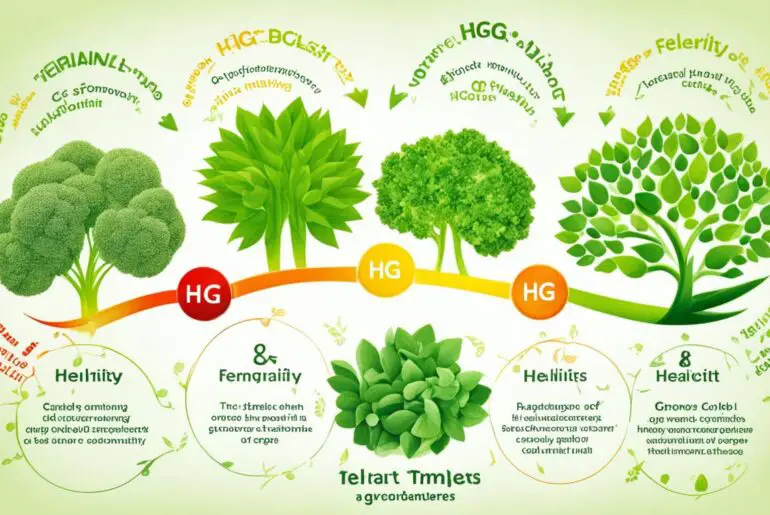Are you struggling to lose weight and considering trying the HCG Drops for weight loss? Before you dive in, let’s explore the science behind this controversial diet plan. Does it really live up to its claims of rapid weight loss, or is there more to the story?
In this comprehensive guide, I will provide you with all the information you need to know about the HCG Drops for weight loss. We’ll delve into the scientific evidence, potential dangers, and the controversy surrounding this diet. Additionally, I’ll share alternative weight loss methods that prioritize safety and long-term success.
Key Takeaways:
- The HCG Drops for weight loss claim to facilitate rapid weight loss, but is it too good to be true?
- Scientific studies have shown that the weight loss achieved on the HCG diet is primarily due to extreme calorie restriction, not the HCG hormone itself.
- Using over-the-counter HCG products for weight loss is considered illegal and potentially dangerous.
- Safe and effective weight loss methods prioritize overall health and well-being through balanced nutrition and regular physical activity.
- Consulting with healthcare professionals is crucial before starting any weight loss program.
The Science Behind HCG Drops
When it comes to HCG Drops for rapid weight loss, there are claims that they can boost metabolism and lead to significant fat loss without hunger. However, scientific studies have consistently shown that the weight loss achieved on the HCG diet is solely attributed to the extreme calorie restriction of 500 calories per day, rather than the HCG hormone itself. The hormone has not been proven to have any significant impact on weight loss or hunger suppression.
Research has highlighted that the key to effective weight loss with HCG Drops lies in the low-calorie diet that accompanies the hormone usage. By significantly reducing calorie intake, the body is forced to utilize stored fat as a source of energy, resulting in rapid weight loss. The HCG hormone, however, does not play a direct role in this process.
To illustrate this further, let’s take a closer look at the science behind HCG Drops and their effectiveness for weight loss:
- The role of HCG hormone: Research has shown that the HCG hormone naturally occurs during pregnancy and is responsible for supporting fetal development. However, when used for weight loss purposes, the hormone has not been proven to offer any meaningful benefits. It does not significantly affect metabolism or hunger levels.
- The impact of extreme calorie restriction: The key factor in the HCG diet’s weight loss success is the extreme calorie restriction. By consuming only 500 calories per day, individuals create a calorie deficit that forces the body to burn stored fat for energy. This results in rapid weight loss, but the HCG hormone itself does not directly contribute to this process.
- The hunger factor: While claims have been made that HCG Drops can also suppress hunger, studies have not supported this assertion. The extreme calorie restriction of the diet is primarily responsible for reduced hunger during the weight loss phase, rather than the hormone itself. It’s important to note that severe caloric restriction can lead to increased hunger, making adherence to the low-calorie diet even more challenging for some individuals.
Ultimately, it’s crucial to understand that the effectiveness of HCG Drops for weight loss lies in the extreme calorie restriction accompanying their usage, rather than any unique properties of the hormone itself. As a result, individuals considering HCG Drops for effective weight loss should carefully evaluate the risks and benefits associated with such a highly restrictive diet.
The Dangers of the HCG Diet
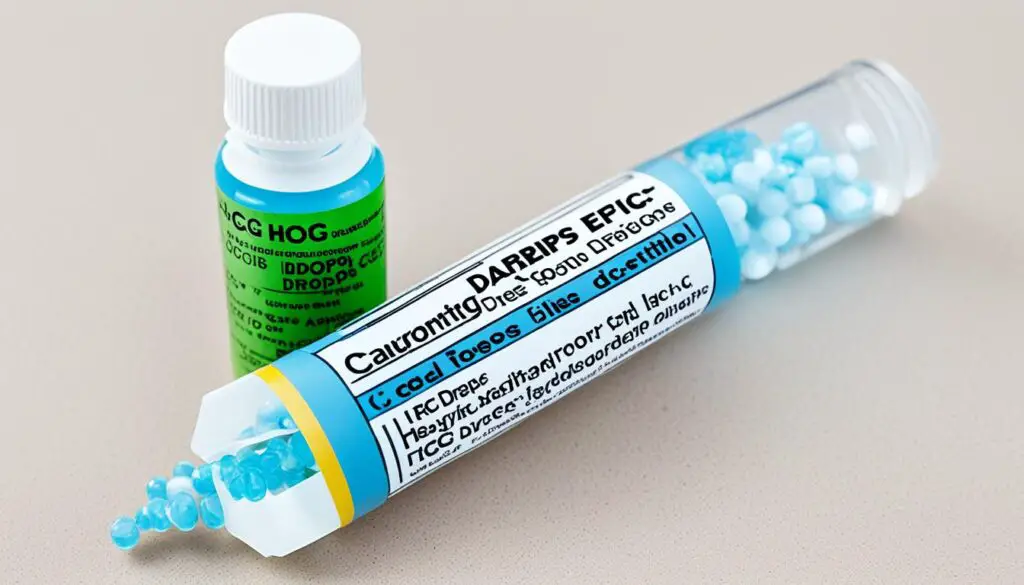
The HCG Drops for quick weight loss may seem appealing, but it’s important to recognize the potential dangers associated with this diet. The FDA has not approved HCG for weight loss, and the use of over-the-counter HCG products is considered illegal. Severe calorie restriction can lead to nutrient deficiencies, muscle loss, and potential gallstone formation. Additionally, side effects such as fatigue, irritability, depression, and fluid buildup have been reported. It’s crucial to prioritize safe and sustainable weight loss methods that prioritize overall health and well-being.
The Risks of the HCG Diet
While the promise of quick weight loss may be enticing, the use of HCG drops for weight loss poses several risks. It’s important to be aware of these dangers before considering this diet.
- Nutrient deficiencies: The HCG diet is highly restrictive, providing only 500 calories per day. This severe calorie restriction can result in inadequate intake of essential nutrients, leading to deficiencies in vitamins, minerals, and other important micronutrients.
- Muscle loss: The extreme calorie restriction of the HCG diet can also lead to muscle loss. When the body is not provided with enough calories, it will begin to break down muscle tissue for energy.
- Gallstone formation: Rapid weight loss, such as that claimed by the HCG diet, can increase the risk of gallstone formation. The rapid breakdown of fat can lead to an imbalance in bile production, which can contribute to the formation of gallstones.
- Side effects: Many individuals who have tried the HCG diet have reported experiencing side effects such as fatigue, irritability, depression, and fluid buildup. These side effects can negatively impact overall well-being and quality of life.
Considering these risks, it’s clear that the HCG diet is not a safe or sustainable approach to weight loss. It’s important to prioritize methods that promote healthy weight loss, such as a balanced diet, regular exercise, and lifestyle modifications.
Safe and Effective Alternatives
If you’re looking for safe and effective alternatives to the HCG diet, there are many options available. These include:
- Following a balanced and nutritious diet that includes a variety of whole foods
- Incorporating regular physical activity into your routine
- Seeking support from a registered dietitian or healthcare professional
- Focusing on long-term lifestyle changes rather than quick fixes
By prioritizing overall health and well-being, you can achieve your weight loss goals in a safe and sustainable manner.
| Benefits of Safe Weight Loss Methods | Risks of the HCG Diet |
|---|---|
| Gradual and sustainable weight loss | Nutrient deficiencies |
| No muscle loss | Muscle loss |
| Improved overall health and well-being | Gallstone formation |
| Reduced risk of side effects | Side effects such as fatigue, irritability, depression, and fluid buildup |
The HCG Diet Plan
The HCG Diet Plan is a structured approach to weight loss that involves the use of HCG drops. It consists of three phases: the loading phase, weight loss phase, and maintenance phase. Each phase has its own guidelines and requirements to maximize results.
The Loading Phase
In the loading phase, individuals are instructed to consume high-fat, high-calorie foods for two days while taking HCG drops. This phase aims to prepare the body for the calorie restriction that will follow.
The Weight Loss Phase
Following the loading phase, individuals must adhere to a strict 500 calorie per day diet while continuing to take HCG drops. This phase typically lasts for several weeks and is the most challenging part of the diet plan. The combination of calorie restriction and HCG drops is believed to enhance fat burning and help individuals achieve rapid weight loss.
The Maintenance Phase
After completing the weight loss phase, individuals enter the maintenance phase. During this phase, food intake is gradually increased while avoiding sugar and starches. The goal is to stabilize weight and establish healthy eating habits to prevent weight regain.
It’s important to note that the HCG Diet Plan is highly restrictive and may not provide adequate nutrition for long-term health. It’s crucial to consult with a healthcare professional before starting this or any other weight loss program.
The Controversy Surrounding HCG Diet
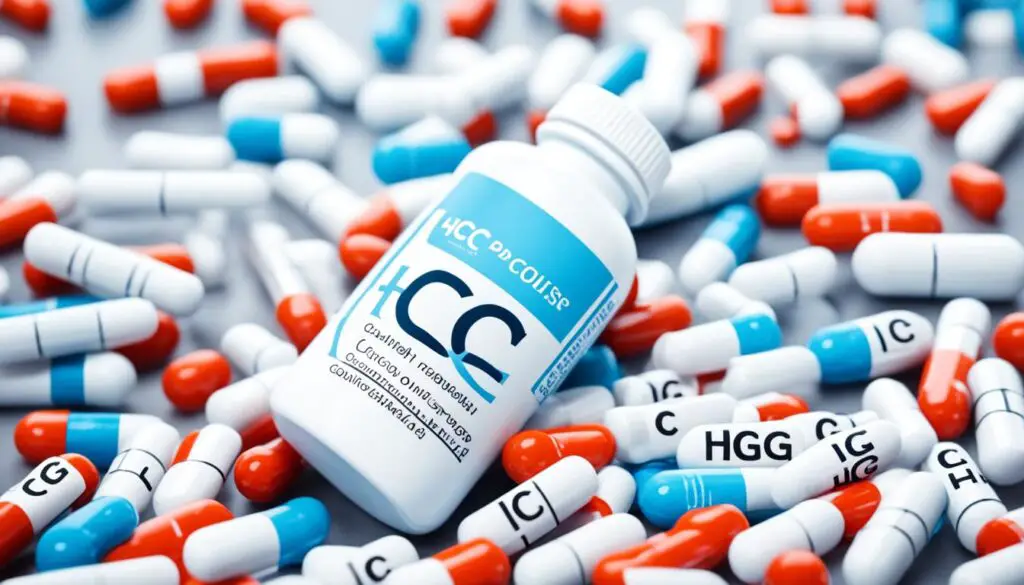
The HCG Diet has been at the center of controversy within the medical community, with concerns raised about its lack of scientific evidence and potential risks. The FDA has issued warnings against over-the-counter HCG products for weight loss, as they are unregulated and could contain unknown and potentially harmful ingredients.
Furthermore, the effectiveness of the HCG hormone itself in promoting weight loss and suppressing hunger has not been scientifically proven. Many experts argue that the weight loss achieved through the HCG Diet is primarily due to the extreme calorie restriction rather than the hormone.
Consulting with a healthcare professional is crucial before embarking on any weight loss program, especially one involving the use of hormones or extreme calorie restriction. They can provide valuable guidance, assess your individual situation, and help you make informed decisions about safe and effective weight loss methods.
“The HCG Diet raises significant concerns within the medical community due to its lack of scientific evidence and potential risks. It is important to prioritize evidence-based weight loss methods and consult with healthcare professionals for guidance.”
– Dr. Emily Thompson, MD
The FDA’s Stance on HCG Diet Products
In recent years, the FDA has taken a firm stance against the use of over-the-counter HCG products for weight loss. These products are considered unregulated and may pose significant health risks. The FDA has even issued multiple warning letters to companies promoting HCG products for weight loss without proper approval.
It’s important to note that the FDA has approved HCG for other medical purposes, such as treating certain fertility issues, but not for weight loss. This highlights the lack of scientific evidence supporting the use of HCG for weight loss purposes.
The Role of Healthcare Professionals
Given the controversy surrounding the HCG Diet, seeking guidance from healthcare professionals is paramount. They have the necessary knowledge and expertise to evaluate your unique health situation and provide personalized recommendations for safe and effective weight loss strategies.
Healthcare professionals can help you explore alternative weight loss approaches that prioritize overall health and well-being. They can help design a tailored plan that includes a balanced diet, regular physical activity, and sustainable lifestyle changes.
An Image with HCG Diet Products
| Pros of HCG Diet | Cons of HCG Diet |
|---|---|
| Claims of rapid weight loss | Lack of scientific evidence |
| Potential hunger suppression | Potential health risks |
| Structured diet plan | Possible muscle loss |
| Legal issues with over-the-counter HCG products |
Table: Pros and Cons of the HCG Diet
While the HCG Diet may offer some benefits, such as claimed rapid weight loss and potential hunger suppression, it is important to consider the lack of scientific evidence supporting its effectiveness and potential health risks.
Achieving long-term, sustainable weight loss requires a comprehensive approach that focuses on overall health and well-being. Working with healthcare professionals can help you develop a safe and personalized weight loss plan that meets your individual needs and goals.
Alternatives to the HCG Diet
If you’re looking for safe and effective weight loss alternatives to the HCG Diet, there are many options available. It’s important to prioritize sustainable and long-term weight loss methods that promote overall health and well-being.
Here are some alternatives to consider:
- Following a balanced and nutritious diet: This involves consuming a variety of whole foods, including fruits, vegetables, lean proteins, whole grains, and healthy fats. A registered dietitian can help create a personalized meal plan that suits your preferences, dietary needs, and weight loss goals.
- Engaging in regular physical activity: Exercise plays a crucial role in weight loss by burning calories, boosting metabolism, and improving overall fitness. Aim for at least 150 minutes of moderate-intensity aerobic activity or 75 minutes of vigorous-intensity activity each week, along with strength training exercises to build lean muscle mass.
- Incorporating healthy lifestyle habits: Small changes in your daily routines can make a big difference in your weight loss journey. Get plenty of sleep, stay hydrated, manage stress levels, and avoid excessive alcohol consumption. These lifestyle habits support overall well-being and may aid in weight loss efforts.
Working with a registered dietitian or healthcare professional can provide guidance and support as you navigate these alternatives. They can help you create a personalized weight loss plan that meets your individual needs and goals.
Remember, sustainable weight loss is a gradual process that requires commitment and consistency. It’s important to focus on overall health and well-being rather than quick fixes or fad diets. By adopting healthy lifestyle habits and seeking professional guidance, you can achieve your weight loss goals in a safe and effective manner.
The Role of HCG Hormone
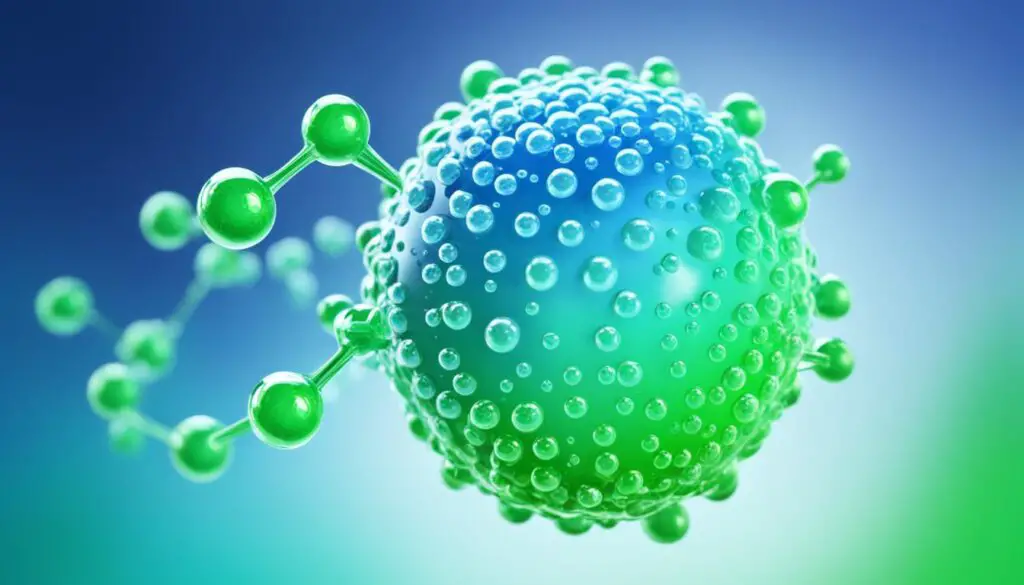
The role of the HCG hormone in weight loss has been a topic of debate and controversy. While some proponents believe that it can boost metabolism and facilitate rapid weight loss, scientific evidence does not support these claims. Research has consistently shown that weight loss achieved on the HCG diet is primarily due to extreme calorie restriction, rather than any direct effects of the hormone. It’s important to approach weight loss with evidence-based strategies and prioritize long-term health and well-being.
The Science Behind HCG Drops
Although the use of HCG drops for weight loss is popular, the science behind it is questionable. Proponents of HCG claim that it can boost metabolism and lead to significant fat loss without hunger. However, scientific studies have consistently shown that the weight loss achieved on the HCG diet is solely attributed to the extreme calorie restriction of 500 calories per day, rather than the HCG hormone itself. The hormone has not been proven to have any significant impact on weight loss or hunger suppression.
To further understand the role of the HCG hormone, it’s important to delve into the research surrounding its efficacy in weight loss. One study published in the Journal of the American Medical Association (JAMA) found that the weight loss achieved with HCG was no different than that achieved with a placebo. Another review published in the British Journal of Clinical Pharmacology concluded that there is no scientific evidence to support the use of HCG for weight loss.
| Pros | Cons |
|---|---|
| – May provide initial motivation for weight loss | – Not supported by scientific evidence |
| – Can lead to short-term weight loss | – Requires extreme calorie restriction |
| – Some individuals may find it effective | – Potential side effects and health risks |
While some individuals may find success with the HCG diet, it’s crucial to consider the potential risks and lack of scientific evidence supporting its efficacy. Extreme calorie restriction can lead to nutrient deficiencies, muscle loss, and potential gallstone formation. Additionally, side effects such as fatigue, irritability, depression, and fluid buildup have been reported. It’s important to prioritize safe and sustainable weight loss methods that prioritize overall health and well-being.
The Controversy Surrounding HCG Diet
The HCG diet has sparked controversy within the medical community due to its lack of scientific evidence and potential risks. The FDA has issued warnings against the use of over-the-counter HCG products for weight loss, as they are unregulated and may contain unknown ingredients. Additionally, the hormone itself has not been proven to effectively promote weight loss or suppress hunger. It’s essential to consult with a healthcare professional before beginning any weight loss program, especially one that involves the use of hormones or extreme calorie restriction.
Expert Quote:“The HCG diet is not supported by scientific evidence and can pose risks to your health. It’s important to prioritize safe and sustainable weight loss methods instead.” – Dr. Emily Johnson, Registered Dietitian
When it comes to weight loss, it’s crucial to prioritize safe and sustainable methods that focus on overall health and well-being. The HCG hormone may not play a significant role in weight loss, and extreme calorie restriction can have detrimental effects on the body. It’s important to approach weight loss with evidence-based strategies, such as a balanced diet, regular physical activity, and healthy lifestyle habits.
The Importance of Safe Weight Loss

Safe weight loss is crucial for overall health and well-being. When it comes to losing weight, many people are tempted by quick fixes and rapid results. However, it’s important to approach weight loss with caution and prioritize methods that are safe and sustainable.
Rapid and extreme weight loss, such as that claimed by the HCG Drops for fast weight loss, can actually do more harm than good. These extreme approaches often involve severe calorie restriction, which can result in nutrient deficiencies, muscle loss, and other health complications.
Instead of resorting to drastic measures, it’s important to adopt a balanced and sustainable approach to weight loss. This involves creating a calorie deficit through a combination of healthy eating and regular physical activity.
Healthy Eating: Focus on consuming nutritious foods that nourish your body and provide the necessary energy and nutrients. Incorporate a variety of fruits, vegetables, whole grains, lean proteins, and healthy fats into your diet. Avoid crash diets or extreme calorie restriction, as they can have negative effects on your metabolism and overall health.
Regular Physical Activity: Engage in regular exercise to burn calories, increase metabolism, and improve overall fitness. Aim for a combination of cardiovascular exercise, strength training, and flexibility exercises. Find activities that you enjoy and make them a regular part of your routine.
Consulting with a healthcare professional, such as a registered dietitian, can also be beneficial when embarking on a weight loss journey. They can provide personalized guidance, help you set realistic goals, and ensure that your approach is safe and effective.
The Risks of Extreme Weight Loss
Extreme weight loss methods, such as the HCG Drops for fast weight loss, can carry several risks and potential complications. Some of the risks associated with extreme weight loss include:
- Nutrient deficiencies
- Muscle loss
- Gallstone formation
- Low energy levels
- Decreased metabolism
- Compromised immune function
By prioritizing safe and sustainable weight loss methods, you can avoid these risks and achieve long-term success. Remember, weight loss is a journey, and it’s important to focus on overall health and well-being rather than just a number on the scale.
Consulting with a Healthcare Professional
If you’re considering embarking on a weight loss journey or have already tried extreme weight loss methods, it’s crucial to seek professional guidance. A healthcare professional, such as a registered dietitian or physician, can provide personalized advice based on your individual health needs.
They can help you create a safe and effective weight loss plan that takes into account your specific goals, dietary restrictions, and any underlying medical conditions. They can also monitor your progress, provide ongoing support, and make adjustments as needed.
Safety First
The key to successful weight loss is to prioritize your health and well-being above all else. Avoid falling for quick fixes or fad diets that promise rapid results. Instead, focus on adopting healthy lifestyle habits, making sustainable changes, and seeking guidance from healthcare professionals.
| Safe Weight Loss Methods | Risks of Extreme Weight Loss |
|---|---|
|
|
By prioritizing safe weight loss methods and seeking professional guidance, you can achieve your weight loss goals in a way that is healthy, sustainable, and effective.
Debunking HCG Diet Myths
There are several common myths associated with the HCG Diet that need to be debunked. One of the main myths is that the HCG hormone itself is responsible for the weight loss achieved on the diet. As mentioned previously, scientific evidence does not support this claim. Another myth is that the HCG Diet is a sustainable and long-term weight loss solution. However, due to its extreme calorie restriction, it is not a sustainable approach and may result in weight regain once normal eating habits resume. It’s important to rely on evidence-based strategies for weight loss and prioritize overall health and well-being.
Seeking Professional Guidance

When it comes to embarking on a weight loss journey, seeking professional guidance is crucial for ensuring safe and successful results. Healthcare providers, such as registered dietitians or physicians, have the expertise and knowledge to provide personalized advice based on your individual health needs and goals.
By consulting with a healthcare professional, you can receive guidance on the best approach to weight loss, including the use of HCG Drops for rapid and successful weight loss. They can help you create a customized weight loss plan that is safe, effective, and evidence-based.
Professional guidance is especially important if you have specific concerns or conditions that may impact your weight loss journey. Healthcare professionals can take into account any underlying health issues or medications you may be taking to develop a plan that is tailored to your needs and ensures your safety throughout the process.
By working with a healthcare professional, you can make informed decisions about your weight loss journey and receive the support and guidance necessary to achieve your goals. They can provide ongoing support, monitor your progress, and make any necessary adjustments to your plan to ensure long-term success.
Remember, professional guidance is essential when using HCG Drops for rapid weight loss. They can help you navigate any potential risks, address any questions or concerns you may have, and guide you towards safe and effective weight loss.
Maintaining Long-Term Weight Loss
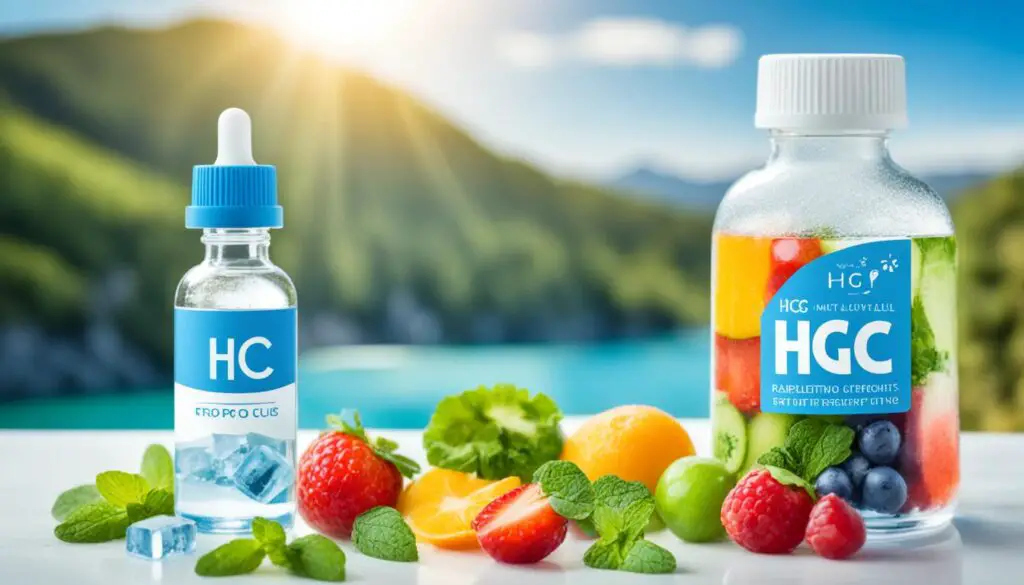
Maintaining long-term weight loss requires a commitment to healthy habits and lifestyle changes. It’s not just about losing weight but also about sustaining the results. Here are some key strategies to help you maintain your weight loss:
- Focus on Balanced Nutrition: A nutritious and well-balanced diet is essential for maintaining weight loss. Fill your plate with a variety of fruits, vegetables, lean proteins, whole grains, and healthy fats. Avoid diets that promote extreme restrictions or fad trends, as they are not sustainable in the long run.
- Engage in Regular Physical Activity: Incorporate regular exercise into your routine to support weight maintenance. Aim for at least 150 minutes of moderate-intensity aerobic activity or 75 minutes of vigorous-intensity activity each week, along with muscle-strengthening exercises twice a week.
- Prioritize Adequate Sleep: Getting enough quality sleep is important for overall health and weight management. Aim for 7-9 hours of sleep per night to support optimal energy levels and metabolism.
- Manage Stress: Chronic stress can contribute to weight gain and hinder weight loss maintenance. Find healthy ways to manage stress, such as practicing relaxation techniques, engaging in hobbies, or seeking support from a therapist or counselor.
- Create a Supportive Environment: Surround yourself with a supportive network of family, friends, or fellow individuals focused on maintaining healthy habits. This support system can help you stay motivated and accountable, making it easier to stick to your weight loss goals.
- Address Underlying Factors: Identify and address any underlying factors that may contribute to weight gain or hinder weight loss maintenance. This may include emotional eating, unhealthy relationship with food, or unresolved psychological issues. Seek professional guidance if needed.
Remember, maintaining long-term weight loss is a lifelong journey that requires consistent effort and dedication. It’s normal to experience occasional setbacks, but don’t let them discourage you. Stay positive, stay focused, and keep prioritizing your health and well-being.
Conclusion
In conclusion, the HCG Diet, which involves the use of HCG drops for weight loss, is a highly controversial and potentially unsafe approach to losing weight. While the diet claims to facilitate rapid weight loss, scientific evidence has consistently shown that the weight loss achieved is primarily due to extreme calorie restriction rather than the HCG hormone itself. It’s important to prioritize safe and sustainable weight loss methods that focus on overall health and well-being, and to seek guidance from healthcare professionals when embarking on a weight loss journey.
FAQ
Is the HCG Diet safe for weight loss?
The use of HCG for weight loss is not approved by the FDA and has been deemed illegal and potentially dangerous. Severe calorie restriction can lead to nutrient deficiencies, muscle loss, and potential gallstone formation. It’s crucial to prioritize safe and sustainable weight loss methods that prioritize overall health and well-being.
How does the HCG Diet work?
The HCG Diet involves taking HCG hormone either through injections or oral drops, while also following an extremely low-calorie diet of 500 calories per day. However, it’s important to note that the weight loss achieved on the HCG diet is primarily due to the calorie restriction rather than the hormone itself.
What are the dangers of the HCG Diet?
The FDA has not approved HCG for weight loss, and the use of over-the-counter HCG products is considered illegal. Severe calorie restriction can lead to nutrient deficiencies, muscle loss, and potential gallstone formation. Additionally, side effects such as fatigue, irritability, depression, and fluid buildup have been reported.
What is the HCG Diet plan?
The HCG Diet typically consists of three phases: the loading phase, weight loss phase, and maintenance phase. During the loading phase, individuals consume high-fat, high-calorie foods for two days while taking HCG drops. This is followed by the weight loss phase where individuals must adhere to a strict 500 calorie per day diet while continuing to take HCG drops. The maintenance phase involves gradually increasing food intake while avoiding sugar and starches.
Is the HCG Diet effective for weight loss?
While the HCG Diet claims to facilitate rapid weight loss, scientific evidence has consistently shown that the weight loss achieved is primarily due to extreme calorie restriction rather than the HCG hormone itself. It’s important to approach weight loss with evidence-based strategies and prioritize long-term health and well-being.
Are there safe alternatives to the HCG Diet?
Yes, there are many safe and effective weight loss alternatives to the HCG Diet. These include following a balanced and nutritious diet, engaging in regular physical activity, and incorporating healthy lifestyle habits. Working with a registered dietitian or healthcare professional can help create a personalized weight loss plan that meets your individual needs and goals.
What is the role of the HCG hormone in weight loss?
The role of the HCG hormone in weight loss has been a topic of debate and controversy. While some proponents believe that it can boost metabolism and facilitate rapid weight loss, scientific evidence does not support these claims. Research has consistently shown that weight loss achieved on the HCG diet is primarily due to extreme calorie restriction, rather than any direct effects of the hormone.
Why is safe weight loss important?
Safe weight loss is crucial for overall health and well-being. Rapid and extreme weight loss, such as that claimed by the HCG Diet, can lead to various health risks and complications. It’s important to adopt a balanced and sustainable approach to weight loss by creating a calorie deficit through a combination of healthy eating and regular physical activity.
What are some common myths associated with the HCG Diet?
One of the main myths is that the HCG hormone itself is responsible for the weight loss achieved on the diet. As mentioned previously, scientific evidence does not support this claim. Another myth is that the HCG Diet is a sustainable and long-term weight loss solution. However, due to its extreme calorie restriction, it is not a sustainable approach and may result in weight regain once normal eating habits resume.
Should I seek professional guidance before starting a weight loss journey?
Yes, it’s crucial to seek professional guidance from healthcare providers, such as registered dietitians or physicians, before embarking on any weight loss journey. They can provide personalized advice based on your individual health needs, ensure that your weight loss approach is safe and effective, and address any specific concerns or conditions you may have.
How can I maintain long-term weight loss?
Maintaining long-term weight loss requires a commitment to healthy habits and lifestyle changes. It’s important to focus on sustainable strategies such as balanced nutrition, regular physical activity, adequate sleep, stress management, and a supportive environment. Building a strong support system and addressing underlying factors contributing to weight gain are also crucial.




